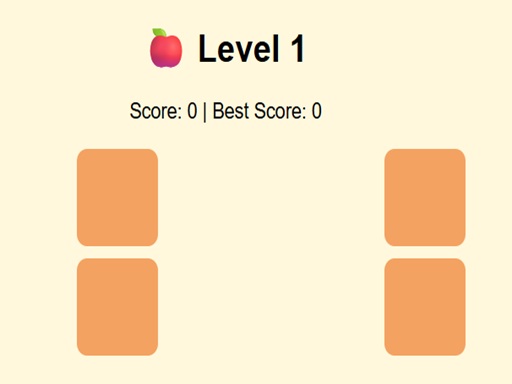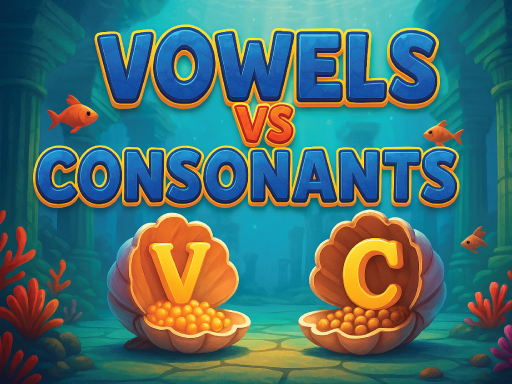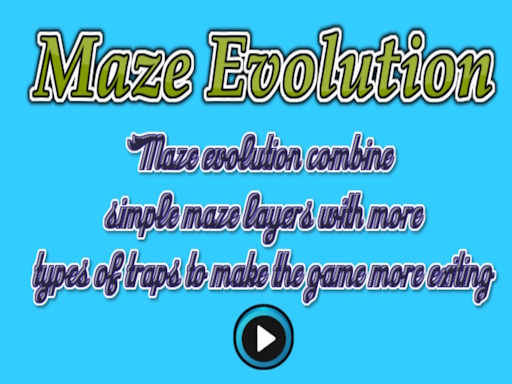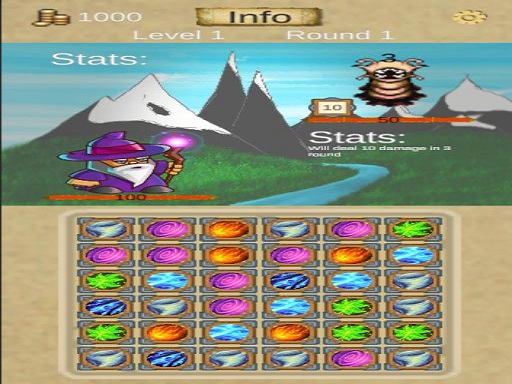Ultimate Slide Challenge
About Ultimate Slide Challenge
Oh man, you guys, I have to tell you about this game. I stumbled upon it almost by accident, buried in a corner of an online store, and honestly, I haven't been able to stop thinking about it since. It’s called *Ultimate Slide Challenge*, and I know, I know, the name sounds a little… well, generic, right? Like some mobile game you play for five minutes and forget. But trust me, this is *not* that. This is something else entirely. It’s got that rare, magical quality that just hooks into your brain and doesn't let go.
You know how some games just click with you? Like they tap into some primal part of your brain that loves order, or strategy, or just the sheer satisfaction of making things *work*? That’s *Ultimate Slide Challenge* for me. I’ve always been drawn to games that demand a certain kind of spatial reasoning, the ones where you have to look at a chaotic mess and somehow, through pure mental gymnastics, find the elegant path to perfection. Think about it: the satisfaction of a perfectly executed combo in a fighting game, or that moment in a strategy game where your grand plan finally comes together and your forces sweep the board. This game captures that feeling, but in a way I’ve never quite experienced before.
At its heart, yes, it's inspired by the classic slide puzzle. You know, those little plastic squares you push around to form an image or order numbers. But to say *Ultimate Slide Challenge* is just a slide puzzle is like saying a symphony is just a bunch of notes. It takes that fundamental concept and blows it wide open, transforming it into something vast, intricate, and surprisingly epic.
Imagine, if you will, not just a small grid on a screen, but an entire world that *is* the puzzle. You’re not sliding tiny tiles; you’re manipulating colossal sections of ancient architecture, re-routing rivers of molten energy, or aligning the very stars in a cosmic clockwork mechanism. The game starts subtly, almost deceptively simple, presenting you with a handful of interlocking segments that need to be reordered. You push one, and another slides into its place, opening up a new path, but also potentially blocking another. It’s that familiar dance, that delicate balance of opening one door while closing another, that immediately draws you in.
But then, the world expands. What starts as a small, contained chamber quickly blossoms into sprawling complexes. You find yourself standing before what looks like the shattered remains of a forgotten civilization, where entire city blocks have been dislodged, their power conduits severed, their transport lines broken. Your task? To slide these massive, interconnected segments back into their rightful places. And it’s not just about getting them in order. Oh no, that’s just the beginning.
What's fascinating is how the game introduces new layers of complexity. You might be working on one level, meticulously shifting a series of platforms to create a bridge, only to realize that the movement you just made on *this* level has also affected a completely different section far below, or perhaps even above you. There are these incredible moments where you’re staring at a seemingly impossible configuration, and then it hits you: the solution isn't just about moving pieces on the visible plane, but about understanding the hidden connections, the way one slide ripples through the entire structure. You can almost feel the gears turning in your own mind as you visualize these intricate, multi-layered movements.
The brilliant thing about this is how it makes you feel like an architect, a master strategist, a digital deity manipulating a miniature universe. You’re not just solving puzzles; you’re restoring order, bringing life back to dormant mechanisms. There’s a palpable sense of weight and consequence to each move. When you slide a massive section of a temple wall, you don’t just see it animate smoothly; you hear the groan of ancient stone, the hiss of displaced air, the faint echo of power conduits reconnecting. The visual feedback is stunning, too – glowing lines of energy snapping into place, water rushing through newly aligned channels, dormant lights flickering back to life. It's incredibly satisfying.
And let me tell you, the frustration is real. There are times when you’ll be stuck for what feels like an eternity, staring at a grid of displaced segments, convinced there’s no way forward. You’ll try every permutation, every wild guess, and just when you’re about to throw your controller across the room (or, you know, gently set it down and walk away for a bit), that’s when the magic happens. That’s when the strategy finally clicks into place. It’s like a sudden burst of clarity, a lightning bolt of understanding that illuminates the entire path forward. You see the sequence, the exact series of slides that will untangle the mess, and then it’s just a matter of execution.
In my experience, the best moments come when you’re facing one of those truly monumental challenges, where the puzzle stretches across what feels like miles of interconnected structures. You might spend an hour, two hours, just chipping away at it, making incremental progress, correcting previous mistakes, and slowly, painstakingly, bringing order to chaos. And then, that final slide. That one perfect move that locks everything into place. The entire structure hums with renewed energy, ancient doors swing open, and a path forward, previously invisible, is revealed. The rush of accomplishment is immense. It’s not just a puzzle solved; it’s a world restored.
What I love about games like this is how they respect your intelligence. They don't hold your hand. They present you with a problem, give you the tools, and trust you to figure it out. There’s a genuine curiosity that drives you forward, a desire to see what intricate, mind-bending challenge the game will throw at you next. Just wait until you encounter the puzzles that involve *multiple* interlocking grids, where a move on one affects the available spaces on another, or the ones where you have to factor in environmental elements like flowing lava or shifting sands that constantly change the playing field. That’s when it truly becomes the *Ultimate* Slide Challenge.
This isn't just a game you play to pass the time; it’s a game you *experience*. You lose track of hours, absorbed in the intricate dance of segments and pathways. You find yourself thinking about the solutions even when you’re not playing, sketching out possibilities in your mind, visualizing the flow of movement. It's that kind of deep, satisfying engagement that only truly brilliant puzzle games can provide. Honestly, if you have even a passing interest in logic, strategy, or just the pure joy of making things work, you owe it to yourself to check out *Ultimate Slide Challenge*. It’s a masterclass in puzzle design, an unexpected gem that has completely captivated me, and I genuinely believe it’ll do the same for you. Get ready to have your brain stretched in the most wonderfully rewarding way possible.
You know how some games just click with you? Like they tap into some primal part of your brain that loves order, or strategy, or just the sheer satisfaction of making things *work*? That’s *Ultimate Slide Challenge* for me. I’ve always been drawn to games that demand a certain kind of spatial reasoning, the ones where you have to look at a chaotic mess and somehow, through pure mental gymnastics, find the elegant path to perfection. Think about it: the satisfaction of a perfectly executed combo in a fighting game, or that moment in a strategy game where your grand plan finally comes together and your forces sweep the board. This game captures that feeling, but in a way I’ve never quite experienced before.
At its heart, yes, it's inspired by the classic slide puzzle. You know, those little plastic squares you push around to form an image or order numbers. But to say *Ultimate Slide Challenge* is just a slide puzzle is like saying a symphony is just a bunch of notes. It takes that fundamental concept and blows it wide open, transforming it into something vast, intricate, and surprisingly epic.
Imagine, if you will, not just a small grid on a screen, but an entire world that *is* the puzzle. You’re not sliding tiny tiles; you’re manipulating colossal sections of ancient architecture, re-routing rivers of molten energy, or aligning the very stars in a cosmic clockwork mechanism. The game starts subtly, almost deceptively simple, presenting you with a handful of interlocking segments that need to be reordered. You push one, and another slides into its place, opening up a new path, but also potentially blocking another. It’s that familiar dance, that delicate balance of opening one door while closing another, that immediately draws you in.
But then, the world expands. What starts as a small, contained chamber quickly blossoms into sprawling complexes. You find yourself standing before what looks like the shattered remains of a forgotten civilization, where entire city blocks have been dislodged, their power conduits severed, their transport lines broken. Your task? To slide these massive, interconnected segments back into their rightful places. And it’s not just about getting them in order. Oh no, that’s just the beginning.
What's fascinating is how the game introduces new layers of complexity. You might be working on one level, meticulously shifting a series of platforms to create a bridge, only to realize that the movement you just made on *this* level has also affected a completely different section far below, or perhaps even above you. There are these incredible moments where you’re staring at a seemingly impossible configuration, and then it hits you: the solution isn't just about moving pieces on the visible plane, but about understanding the hidden connections, the way one slide ripples through the entire structure. You can almost feel the gears turning in your own mind as you visualize these intricate, multi-layered movements.
The brilliant thing about this is how it makes you feel like an architect, a master strategist, a digital deity manipulating a miniature universe. You’re not just solving puzzles; you’re restoring order, bringing life back to dormant mechanisms. There’s a palpable sense of weight and consequence to each move. When you slide a massive section of a temple wall, you don’t just see it animate smoothly; you hear the groan of ancient stone, the hiss of displaced air, the faint echo of power conduits reconnecting. The visual feedback is stunning, too – glowing lines of energy snapping into place, water rushing through newly aligned channels, dormant lights flickering back to life. It's incredibly satisfying.
And let me tell you, the frustration is real. There are times when you’ll be stuck for what feels like an eternity, staring at a grid of displaced segments, convinced there’s no way forward. You’ll try every permutation, every wild guess, and just when you’re about to throw your controller across the room (or, you know, gently set it down and walk away for a bit), that’s when the magic happens. That’s when the strategy finally clicks into place. It’s like a sudden burst of clarity, a lightning bolt of understanding that illuminates the entire path forward. You see the sequence, the exact series of slides that will untangle the mess, and then it’s just a matter of execution.
In my experience, the best moments come when you’re facing one of those truly monumental challenges, where the puzzle stretches across what feels like miles of interconnected structures. You might spend an hour, two hours, just chipping away at it, making incremental progress, correcting previous mistakes, and slowly, painstakingly, bringing order to chaos. And then, that final slide. That one perfect move that locks everything into place. The entire structure hums with renewed energy, ancient doors swing open, and a path forward, previously invisible, is revealed. The rush of accomplishment is immense. It’s not just a puzzle solved; it’s a world restored.
What I love about games like this is how they respect your intelligence. They don't hold your hand. They present you with a problem, give you the tools, and trust you to figure it out. There’s a genuine curiosity that drives you forward, a desire to see what intricate, mind-bending challenge the game will throw at you next. Just wait until you encounter the puzzles that involve *multiple* interlocking grids, where a move on one affects the available spaces on another, or the ones where you have to factor in environmental elements like flowing lava or shifting sands that constantly change the playing field. That’s when it truly becomes the *Ultimate* Slide Challenge.
This isn't just a game you play to pass the time; it’s a game you *experience*. You lose track of hours, absorbed in the intricate dance of segments and pathways. You find yourself thinking about the solutions even when you’re not playing, sketching out possibilities in your mind, visualizing the flow of movement. It's that kind of deep, satisfying engagement that only truly brilliant puzzle games can provide. Honestly, if you have even a passing interest in logic, strategy, or just the pure joy of making things work, you owe it to yourself to check out *Ultimate Slide Challenge*. It’s a masterclass in puzzle design, an unexpected gem that has completely captivated me, and I genuinely believe it’ll do the same for you. Get ready to have your brain stretched in the most wonderfully rewarding way possible.
Enjoy playing Ultimate Slide Challenge online for free on Colosm. This Puzzle game offers amazing gameplay and stunning graphics. No downloads required, play directly in your browser!
How to Play
Mouse or Touch





Comments
This game is awesome! I love the graphics and gameplay.
One of the best games I've played recently. Highly recommended!